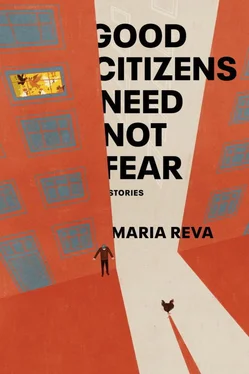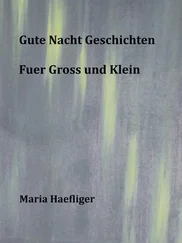Maria Reva
GOOD CITIZENS NEED NOT FEAR
STORIES
The statue of Grandfather Lenin, just like the one in Moscow, 900 kilometers away, squinted into the smoggy distance. Winter’s first snowflakes settled on its iron shoulders like dandruff. Even as Daniil Petrovich Blinov passed the statue and climbed the crumbling steps of the town council behind it, he felt the Grandfather’s 360-degree gaze on the back of his head, burning through his fur-flap hat.
Inside the town council hall, a line of hunched figures pressed against the walls, warming their hands on the radiators. Men, women, entire families progressed toward a wall of glass partitions. Daniil entered the line. He rocked back and forth on the sides of his feet. When his heels grew numb, he flexed his calves to promote circulation.
“Next!”
Daniil took a step forward. He bent down to the hole in the partition and looked at the bespectacled woman sitting behind it. “I’m here to report a heating problem in our building.”
“What’s the problem?”
“We have no heat.” He explained that the building was a new one, this winter was its first, someone seemed to have forgotten to connect it to the district furnace, and the toilet water froze at night.
The clerk heaved a thick directory onto her counter. “Building address?”
“Ivansk Street, Number 1933.”
She flipped through the book, licking her finger every few pages. She flipped and flipped, consulted an index, flipped once more, shut the book, and folded her arms across it. “That building does not exist, Citizen.”
Daniil stared at the woman. “What do you mean? I live there.”
“According to the documentation, you do not.” The clerk looked over Daniil’s shoulder at the young couple in line behind him.
Daniil leaned closer, too quickly, banging his forehead against the partition. “Nineteen thirty-three Ivansk Street,” he repeated, enunciating each syllable.
“Never heard of it.”
“I have thirteen, no, fourteen people living in my suite alone, who can come here and tell you all about it,” Daniil said. “Fourteen angry citizens bundled up to twice their size.”
The clerk shook her head, tapped the book. “The documentation, Citizen.”
“We’ll keep using the gas, then. We’ll leave the stove on day and night.” The stove offered little in the way of heating, but Daniil hoped the wanton waste of a government-subsidized resource would stir a response.
The woman raised her eyebrows; Daniil appeared to have rematerialized in front of her. “Address again?”
“Nineteen thirty-three Ivansk Street, Kirovka, Ukraine, USSR. Mother Earth.”
“Yes, yes. We’ll have the gas-engineering department look into it. Next!”
—
Was it fourteen now? Had he included himself in the count? Carefully avoiding the ice patches on the sidewalk on his way home, Daniil wondered when he had let the numbers elude him. Last month twelve people had been living in his suite, including himself. He counted on his fingers, stiff from the cold. In the bedroom, first corner, Baba Ola slept on the foldout armchair; second corner, on the foldout cot, were Aunt Inaya and Uncle Timko and their three small children (but Uncle Timko promised they’d be assigned their own place soon because of his job superintending the municipal square’s public restroom—a government position); third corner, Daniil’s niece and her friend, but they hardly counted, since they ate little and spent most of their time at the institute; fourth corner, Daniil himself, bunking under Uncle Timko’s mother, (Great) Aunt Nika; in the hallway, someone’s mother-in-law or second cousin or who really knew, the connection was patchy; on the balcony camped Second Cousin Glebik and his fiancée and six hens, which were not included in the count but who could forget the damn noisy birds? That made thirteen. He must have missed someone.
Daniil’s name had bounced from wait list to wait list for three years before he’d been assigned to his apartment by the Kirovka Canning Combine, where he worked as a packaging specialist. The ten-story paneled novostroïka was newly built and still smelled of mortar. His fifth-floor suite was no larger than the single room he had shared with his parents in a communal apartment, but he could call it his own. The day he’d moved in had been nothing short of sublime: he’d walked to his sink, filled a glass of water, guzzled it down, then lay on the kitchen floor with his legs squeezed into the gap between the stove and table. Home was where one could lie in peace, on any surface. He felt fresh and full of hope. Then came a knock at the door. Daniil’s grandmother burst into the apartment, four mildewy sacks of grain and a cage full of hens strapped to her back. She spoke Ukrainian, which Daniil barely understood, having been raised and educated in Russian. She cursed her neighbor, who either was in love with her or had it in for her and had threatened to poison himself, or her, or perhaps both. Daniil simply nodded, ashamed to ask for clarification. And so Baba Ola stayed.
Two. Two had been fine. Until two became fourteen.
—
Minimum Dimensions of Space Necessary for Human Functioning, 85 processes: Sleeping (based on average Moscow male, head to toe) = 175 cm. Standing (gravitational effect included) = 174.5 cm. Opening oven (based on average Moscow female, buttocks to baking tray) = 63.5 cm. Washing face (elbow to elbow) = 52 cm. Opening refrigerator (door span area) = π(55 cm) 2÷ 4. Lacing up boots (floor space) = 63.5 cm x 43 cm. Pulling out dining chair (floor space) = 40 cm x 40 cm. Mending clothing, shoes, other (floor space) = 40 cm x 40 cm. Child rearing (floor space for corner time) = 30 cm x 30 cm. Watching educational television programs = 64.5 cm x 40 cm. Listening to educational radio programs = 64.5 cm x 40 cm. Evacuating bladder (volume) = 400 ml. Mental training (based on average Moscow male, brain volume) = 1260 cm 3. Dreaming = 1260 cm 3…or ∞? Breathing (torso expansion) = 1.5 cm. Yawning (torso expansion) = 3 cm. Sneezing (torso retraction) = 3–4 cm. Stretching (limb extension) = n/a. Etc. Etc. Minimum dimensions necessary for human functioning (TOTAL) = 9 m 2.
—
Daniil stuffed his hands back into the damp warmth of his pockets as he climbed the narrow set of stairs to his floor.
Suite 56 greeted him with its familiar smell, boiled potatoes and fermenting cabbage. “Daniil, is that you?” Aunt Nika hollered from the kitchen. At sixty-five, her voice retained its cutting timbre, perfectly suited for her job hawking seed oils at the bazaar. “Come look, we get barely any gas.”
Daniil cringed. He had wanted to remain unnoticed by his relatives for a few seconds longer. When he opened the closet to hang his coat, a pair of gray eyes stared back at him, round and unblinking. Daniil started. He had forgotten Grandfather Grishko, who slept standing, as he used to do while guarding a military museum in Kiev. This was the fourteenth member of the Blinov residence. Daniil closed the door softly.
“Took me three hours to boil potatoes,” Aunt Nika told Daniil when he stepped into the kitchen. She wore a stained apron over a floor-length mink coat inherited from her grandmother. Its massive hood obscured her face. She turned the knobs to maximum; the burner heads quivered with a faint blue. “Did you go to the town council? They should look into it.”
Читать дальше













